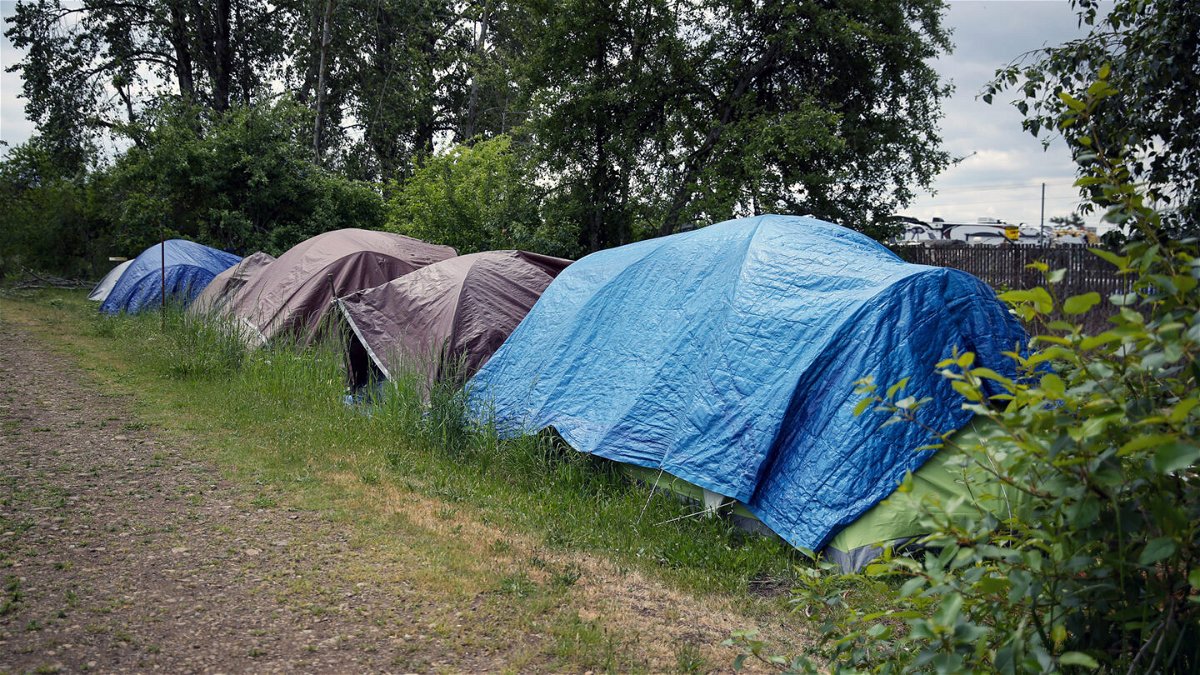Oregon bill that would decriminalize homeless encampments and propose penalties if unhoused people are harassed will not move forward

A homeless camp is seen at Cascades Gateway City Park on Friday
By Steve Almasy, Laura Studley and Nouran Salahieh, CNN
An Oregon bill that would decriminalize homeless encampments in public places and allow homeless people to sue for $1,000 if harassed or told to leave will not move forward.
The bill, HB 3501, proposed allowing unhoused people to use public spaces “without discrimination and time limitations” regarding their housing status, according to the text.
“Many persons in Oregon have experienced homelessness as a result of economic hardship, a shortage of safe and affordable housing, the inability to obtain gainful employment and a disintegrating social safety net system,” said the bill, which was sponsored by Rep. Farrah Chaichi, a Democrat whose district includes Beaverton, and Rep. Khanh Pham, from southeast Portland. “Decriminalization of rest allows local governments to redirect resources from local law enforcement activities to activities that address the root causes of homelessness and poverty.”
Chaichi subsequently told CNN the purpose of the bill was to protect the rights of people suffering homelessness, and to help “keep people alive” while housing is secured.
“Shelter is a vital human need for everyone,” she said in the statement. “The forced removal from and destruction of people’s only shelter has fatal consequences. That’s why we must stand up for these people whose rights are being violated; their lives depend on it.”
“The bill cannot move forward this session because several key deadlines that bills need to meet have already passed — because of this, the hearing was entirely for the purpose of hearing public input on the concept in the bill,” Oregon House Majority Leader Julie Fahey said in a statement last week.
Fahey, who does not support the measure, said lawmakers in both parties have had concerns about the bill.
“House Bill 3501 doesn’t have the support or the time to move forward, full stop,” Fahey said in the statement, adding that the measure “has become a significant distraction from all of the work we’re doing this legislative session.”
Public opposition to the measure had been sizable, according to a list of submitted testimonies.
“We cannot give these people legal protection to do as they please in our public spaces, and strip our citizens of their own rights to use these same spaces,” wrote Portland resident Carlin Scott. “Portland is struggling right now to retain residents, and the increasing encroachment of homeless camps on our public lands is a big reason why we’re losing residents.”
According to the 2022 point-in-time count of homeless people conducted by Multnomah County, which includes Portland, people counted as homeless as defined by the US Department of Housing and Urban Development increased 30.2% during the pandemic. And the number of people who were unsheltered grew by 50% from 2019 to 2022.
The US Census Bureau estimates about 641,000 people live in Portland as of last July.
Jimmy Jones, executive director of the Mid-Willamette Valley Community Action Agency, earlier showed support for the proposed legislation.
“It expresses a sentiment that we are all here to protect the dignity, the welfare, the legal right of this community,” Jones previously told CNN. “We certainly don’t want to see people harassed simply because they don’t know where to go.”
Jones said people are losing patience, but there is nowhere to go.
“People don’t disappear,” he said. “Moving people around just chases the issue from one place to another.”
Others who supported the bill said they believe unhoused people are deserving of help just as anyone else is.
“For too long law enforcement has acted to effectively enclose public land from common use, especially use by down-on-their luck Oregonians,” said Jackson Miller, a Portland resident. “While this bill is no public housing guarantee or major zoning reform, it does seem like it will ensure certain rights of homeless individuals and as such represents an important step in the right direction.”
The Right to Rest Act was also introduced in 2021 but didn’t make it out of the judiciary committee.
Courts have ruled that municipalities violate the Eighth Amendment when they criminally prosecute people who have no other choice but to sleep outside in public. In 2018, a federal appeals court in Portland ruled against Boise, Idaho, writing: “The panel held that, as long as there is no option of sleeping indoors, the government cannot criminalize indigent, homeless people for sleeping outdoors, on public property, on the false premise they had a choice in the matter.”
In 2022, the federal appeals court in San Francisco made a similar ruling against the town of Grants Pass, Oregon.
Correction: A previous version of this story said CNN had not heard back from Chaichi, but the representative responded April 29.
The-CNN-Wire
™ & © 2023 Cable News Network, Inc., a Warner Bros. Discovery Company. All rights reserved.



